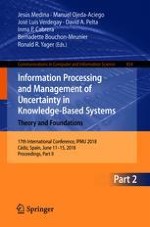2018 | OriginalPaper | Buchkapitel
An Efficient Gradual Three-Way Decision Cluster Ensemble Approach
verfasst von : Hong Yu, Guoyin Wang
Erschienen in: Information Processing and Management of Uncertainty in Knowledge-Based Systems. Theory and Foundations
Aktivieren Sie unsere intelligente Suche, um passende Fachinhalte oder Patente zu finden.
Wählen Sie Textabschnitte aus um mit Künstlicher Intelligenz passenden Patente zu finden. powered by
Markieren Sie Textabschnitte, um KI-gestützt weitere passende Inhalte zu finden. powered by
